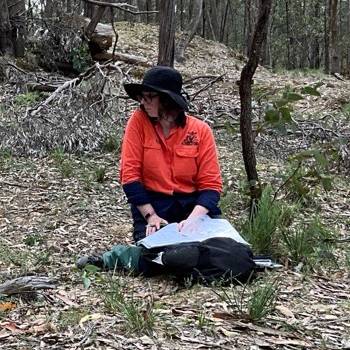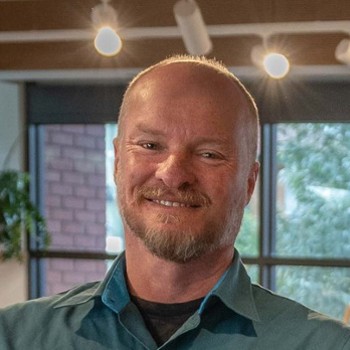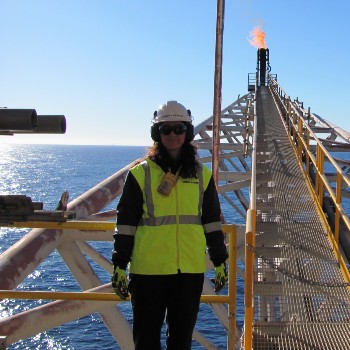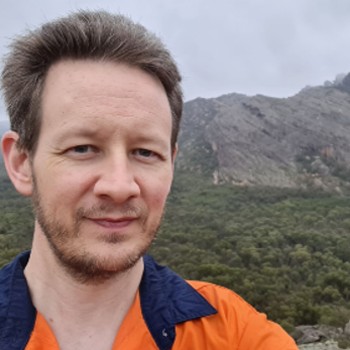Science skills in Resources
National Science Week is a celebration of all things science and technology, it provides an opportunity this year to shine the spotlight on four of the Resources Victoria team who use their skills every day in very practical ways.
Louise, Sandra, Mark and Tim are four of our science stars who use similar skills to benefit Victoria in different ways.
Mark and Louise are using geoscience to help us better understand the resources that may be hidden beneath the Earth’s surface. Sandra and Tim are using their science backgrounds to ensure resources projects are delivered in safe and sustainable ways.
Dr Louise Goldie Divko - Acting Director of the Geological Survey of Victoria
 Tell us about your role
Tell us about your role
I’m acting in the role of Director at the Geological Survey of Victoria (GSV). Over the past 17 years I’ve enjoyed preparing scientific reports, completing geoscience projects, working in the field and at our drill core library. It’s been rewarding to engage with stakeholders and the community, as well as to collaborate with colleagues across government.
How did you get into your career?
When I was at secondary school the teacher always skipped the earth science chapters in our textbook. When I started my science degree there was the option to study earth sciences. I was rapt!! I went on to work as a geologist in the private sector before taking a detour into secondary school teaching for four years. A PhD led me back to geoscience. Careers are not always linear.
What benefits does your role bring to the state?
Locating the minerals required to develop renewable energy or the raw materials needed for construction depends on sound geoscience. Better understanding geology provides us with insights as to where these resources might be hidden underground. Without geoscience exploring for resources would involve a lot of guess work and that means areas would be unnecessarily disturbed. With publicly available modern datasets and knowledge, exploring for resources is targeted, reducing the impact on the environment and communities.
What advice would you have for those interested in a science-based career?
Science plays a huge role in our daily lives. To reduce our impact on climate change we’ll need more curious and innovative minds than ever to maintain our standard of living and reach net zero targets. There are many varied science roles out there – just look at the variety within the Department of Energy Environment and Climate Action.
Tim Bessell-Browne - Manager, Complex Mines, Fire and Emergency
 Tell us about your role
Tell us about your role
I manage the Complex Mines Fire and Emergency team within the Earth Resources Regulator.
My role supports the safe operation of coal mines in the Latrobe Valley. These mines have complex risks, which are challenging to manage. We need to meet that challenge head on.
How did you get into your career?
Rather than a geology or engineering degree, which might be more typical in my area of work, I have a science degree in ecology.
Initially, I worked at Agriculture Victoria as a freshwater ecologist before heading to the EPA where I worked in several risk management and emergency response roles. Then I accepted a position with Parks Victoria as Ranger in Charge of Fire and Emergency.
My training and experience have given me the skills to manage the regulation of emergency and risk at coal mines.
What benefits does your role bring to the state?
My teams’ work reduces risk to the environment, community and infrastructure from activities at coal mines. Importantly, we also minimise the risks associated with moving away from coal-fired electricity and rehabilitating the site.
What advice would you have for those interested in a science-based career?
Science can take you anywhere you want to go, so long as you seize the day!
Scientific method has been fundamental to my career. It has guided me to be situationally aware, to seek unbiased evidence and objectively assess information before making a decision.
Sandra Vin - Manager Petroleum Assessments
 Tell us about your role
Tell us about your role
I am responsible for assessing operational plans for exploration, production and decommissioning of gas resources. It sounds simple when you say it like that but these things are complex and usually bring a suite of issues to work through, so there is never a dull moment!
How did you get into your career?
It certainly wasn’t planned! I was working in a laboratory while I was at Uni and my supervisor flagged that a data entry role was available at the Geological Survey of Victoria (GSV). Being a poor student, I jumped at the chance.
Since then, I’ve moved into roles as a GIS Officer, Licensing Officer, Work Plan Assessor. At one point, while working as an environmental inspector I had audited every gas platform in Bass Strait (prior to 2011).
All that has led me to where I am now - managing and coordinating assessments of petroleum industry activities.
What benefits does your role bring to the state?
The oil and gas industry has had no major incidents in Victoria. Through rigorous assessments of proposals, I’m keen to make sure that continues.
What advice would you have for those interested in a science-based career?
Start with what you like and then be open to whatever opportunities come on your way – you never know where they’ll lead you. Be prepared to refine your skills and attributes – they are transferrable in a science-based career.
Dr Mark McLean - Team Leader Geophysics and Geological Modelling
 Tell us about your role
Tell us about your role
I am a geoscientist with the Geological Survey of Victoria (GSV), where I lead a team responsible for acquiring, managing and interpreting the state’s geophysical datasets and for building complex 3D geological models of Victoria’s rocks. The best part of my role is uncovering Victoria's geology and tackling the challenges of understanding how it has evolved over time.
I also have a part-time role lecturing at The University of Melbourne where I collaborate with astronomers researching an exciting new technique called ‘muon tomography’. This is a revolutionary development in geophysics that uses particles from space to image geology. I also teach Applied Geophysics and supervise postgraduate students. It’s a rewarding role, particularly when I witness the moment a student grasps a concept and develops the same enthusiasm for geophysics and geology that I have.
How did you get into your career?
I have always loved learning about the Earth, which inspired me to study geology in high school. This passion led me to pursue a BA/BSc and an MSc at Monash University, followed by a PhD at The University of Melbourne. My PhD involved acquiring an airborne geophysical survey in East Antarctica and building 3D geological models of the geology beneath several kilometres of ice. The 3D modelling experience I acquired was well-aligned to the requirements at the Geological Survey of Victoria. I have been building models of rocks ever since.
What benefits does your role bring to the state?
Geophysics has a (not so secret) super-power – which is to ‘see through’ the overlying cover rocks and soil profile to understand the geology beneath. This is crucial because we've already discovered all the ‘easy to find’ earth resources - they were sticking out of the ground! The challenge today is to find resources that are completely buried. To achieve this, we use geophysics, 3D modelling and several other techniques to image the Earth's structure. The more we learn about Victoria's geology, the more we can predict where Victoria’s Earth resources are likely to be hidden. Making this knowledge available to explorers not only boosts the state’s economy but also helps us find the critical minerals needed for a net-zero future.
What advice would you have for those interested in a science-based career?
My advice for anyone interested in science is to let your passion drive you to analyse the data and seek answers. The best scientists excel because they are passionate about what they do and love the puzzles science presents. If this resonates with you, let your curiosity lead you to question everything and ‘uncover every stone’ (pun unintended). Importantly, expect your research to face setbacks (because it probably will), but stay motivated and keep pushing forward.
Page last updated: 10 Feb 2025